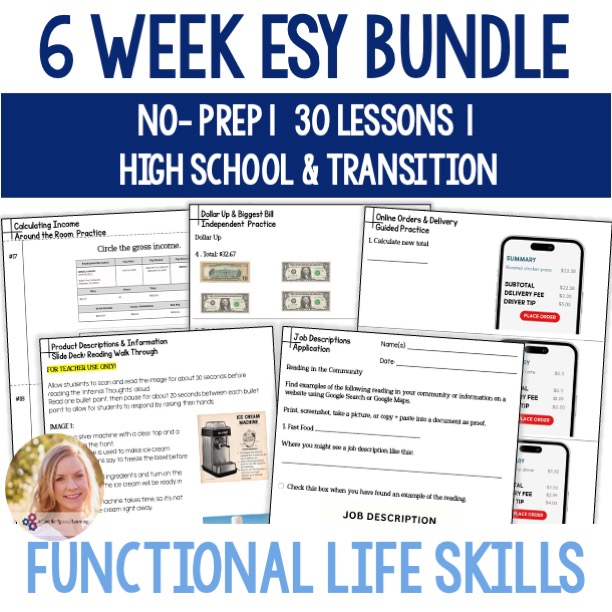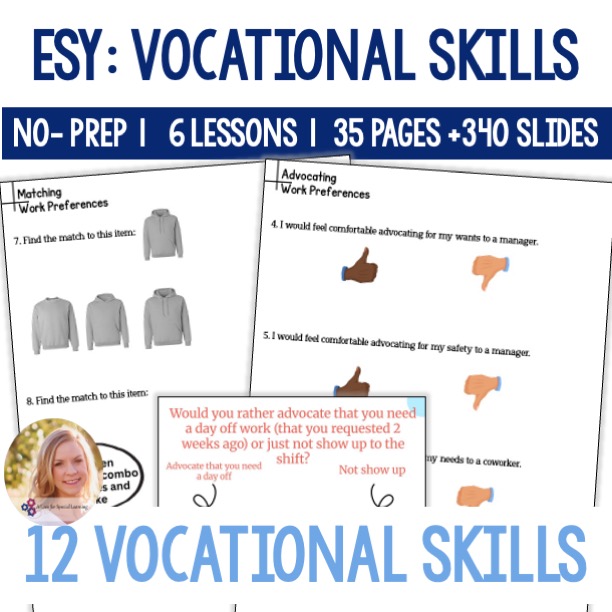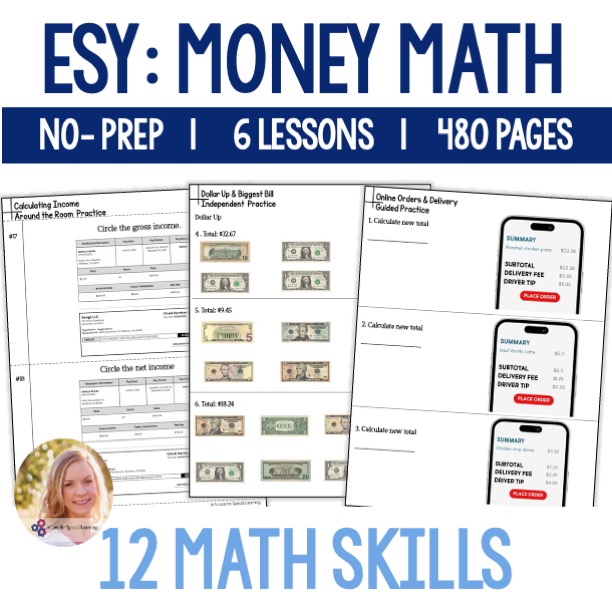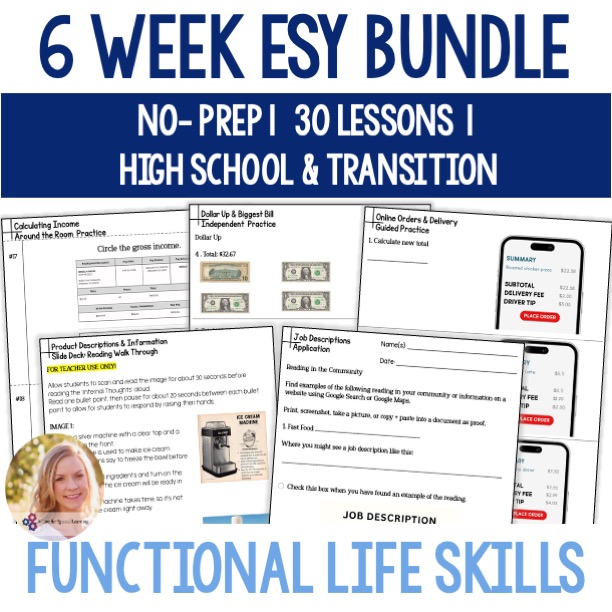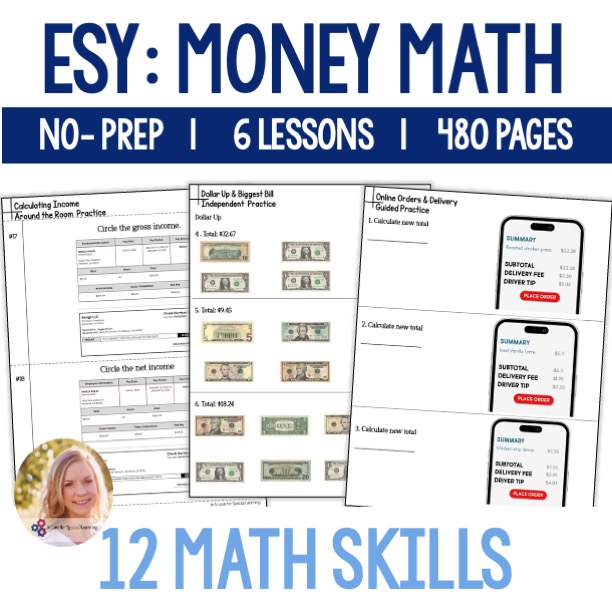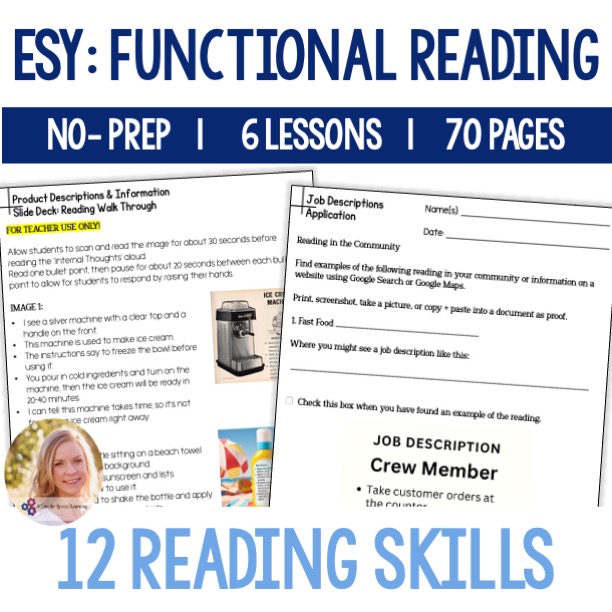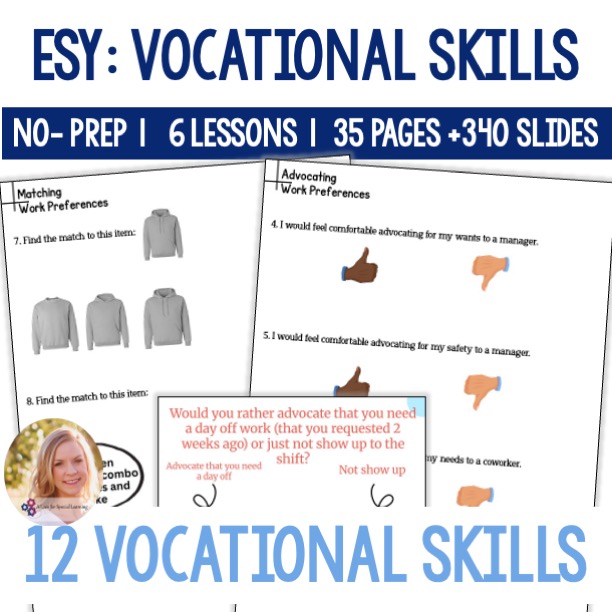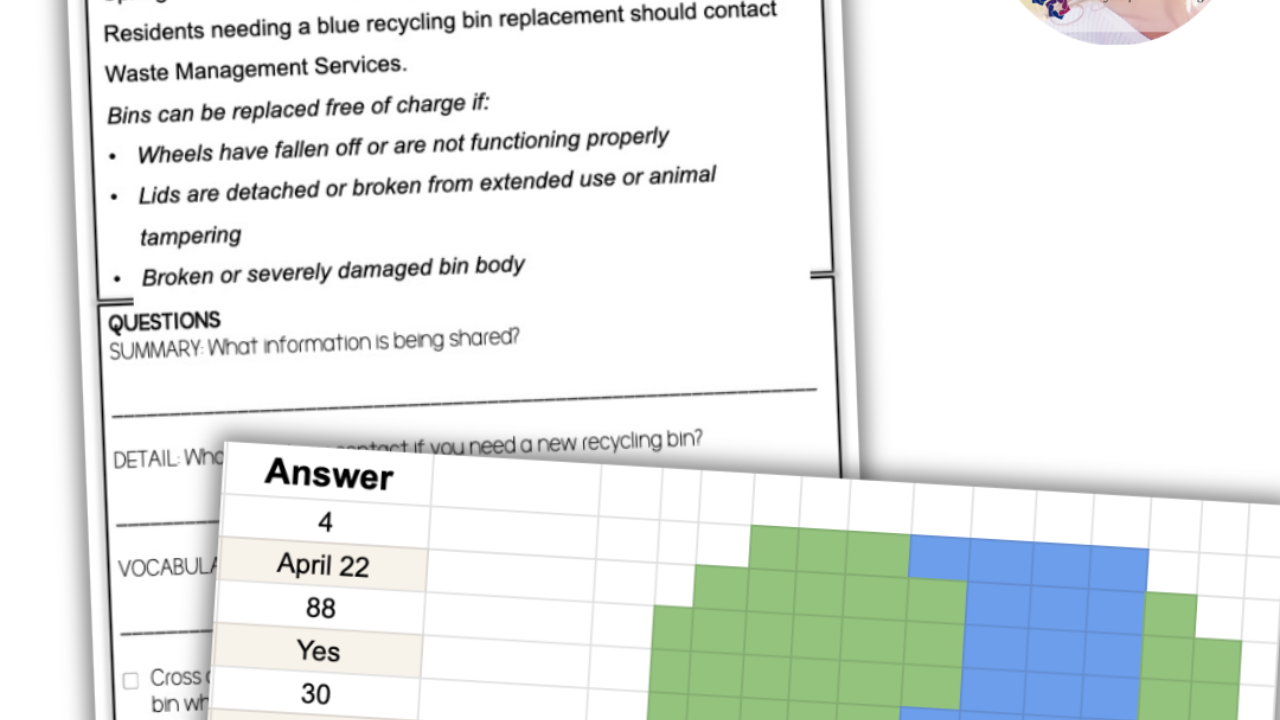Lesson Ideas for ESY for the High School & Transition Life Skill Classroom
Jun 05, 2023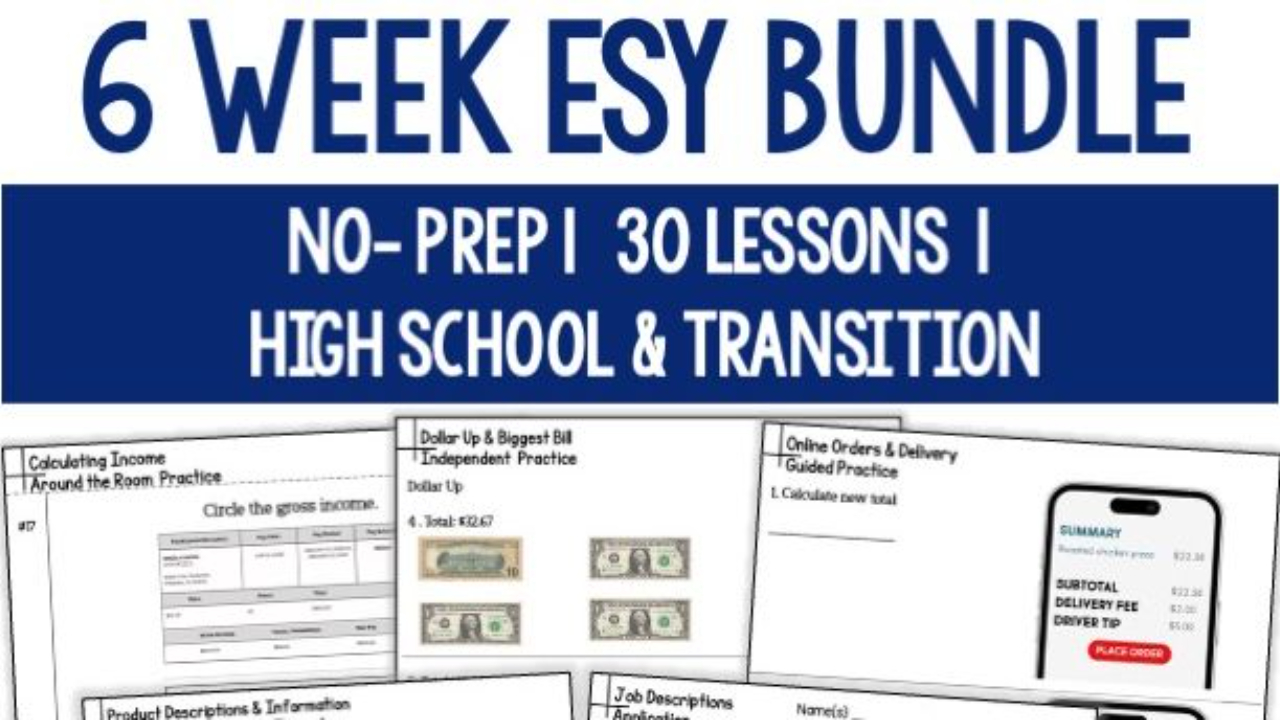
By IDEA definition, ‘extended school year services means special education and related services that are provided to a child with a disability beyond the normal school year of the public agency; in accordance with the child’s IEP; and at no cost to the parents of the child.’ The last part, 'at no cost to the parents of the child,' is because an ESY program for special education services falls under free appropriate public education (FAPE).
However, Wrightslaw goes into a little more detail and references the standard of recoupment/regression. Legalease aside, ESY is a time to continue addressing specific skills for eligible students, to learn about new students, and to have a little fun (especially in the summer months)!
Let me be clear, addressing the student's IEP goals that have been identified for ESY is the most important. So, let that guide your lesson planning!
While ESY lesson plans don't typically include learning a wide range of new skills that special education teachers typically plan to cover during the regular school year, there may be opportunities to introduce new routines or expectations that are specific to secondary transition, including community social skills and vocational site communication, among others.
Top 15 Tips and Resources for High School and Transition ESY Teachers:
1. Always Be Ready
Imagine condensed versions of your most essential lessons from the school year that have already been made. Imagine the slide deck, activity, and practice is done, just click, print, and go. Imagine NOT having to re-use or write from scratch, just walk into ESY with age-appropriate, meaningful, relevant lessons. You CAN be ready for 6-WEEKS of ESY with the ESY 6-Week Functional Life Skills Bundle! From functional math, to life skills, money math, food/cooking, and functional reading, this bundle covers it A-L-L. And, bonus points for NEW Question of the Day prompts (specific to ESY) AND movement videos, which are only available with the bundle.
2. Get to Know Your New Students
If you're teaching freshman or new-to-transition students (or school staff), ESY is a great time to get to know them really well. While you want to maintain your typical expectations, ESY classes are typically smaller and have a tad less go-go-go structure, which allows for learning your new students triggers, comforts, skills, and communication style.
If you are looking for a resource to get to know your students better, check out the Getting to Know You resource. It’s age appropriate for high school and transition age students and is the non-ice breaker get-to-know-you activities you’re looking for!
3. Establish Start and/or End of the Day Routines
Using a Question of the Day resource is a great way to get topic-specific conversation going, to practice communication using AAC systems, and to learn so much about your students organically. A Question of the Day routine is the perfect start to a day or a way to wind down before loading the busses to go home.
4. Choose Activities You Can Complete Indoors OR Outdoors
For summer ESY programming, consider planning activities that can be completed in the classroom or outside in a courtyard, park, or other school property. The ESY Vocational Skills 6 Lesson resource includes 12 versions of an activity where students are given a work scenario and have to choose between two options. While you can tape a line down the center of a classroom and use opposing walls as response locations, you can also get everyone outside and designate two different zones as response locations.
5. Get a Baseline of Basic Skills
Get to know your students really well by having them show you their skills! This can be super helpful if you shift from their ESY teacher to the school year teacher in the fall as you can now determine what skills you’ll need to address during the school year. While many of them are independent living skills, the questions can also provide insight into the student's job skills. The information gained from a basic skills assessment will be helpful to the entire IEP team, especially during back-to-school time, because so many critical skills are included in the resource.
For young adults who have higher support needs, check out this resource:
6. Choose Resources for Easy IEP Goal Updates
When previewing the ESY IEP goals at the start of the session, make note of goals written with a % or number of trials. Then, be sure to choose or write resources that would easily lend itself to reporting. For example, if a goal is written for money math (i.e., budgeting) 'out of 10 trials' then be sure your activity or resource has 10 opportunities (or trials). This will allow you to gather meaningful data that you can quickly and easily report out on.
If you DO have money math IEP goals 'out of 10 trials' or with '% accuracy' then check out the 6-Lesson Money Math ESY Resource, as the Independent Practice worksheets are 10 questions long for this very reason!
7. Include a Variety of Learning, from Independent to Partners to Small Group
A flexible resource means that you can divide up students in many different ways or let them complete the learning task on their own. You can gauge each student's skills and teamwork skills at the same time! The Calculating Income to Pay Bills Budget Activity (and Boom Cards) works for independent, partner, and small group work AND has one page for special education teachers or students to customize!
8. Preview Employment Skills for Community-Based Learning Vocational Sites
For students who will be new to community-based vocational sites, increasing their work shift length, or branching out to new sites, a lesson specific to Ready-to-Work Employability Skills Lesson Unit can be the ideal introduction or refresher for ESY. Complete with 5 DAY LESSON PLANS, this resource could easily span an entire week of ESY!
9. Include Movement
Whether you take a walk/stroll outside with your students for some fresh air or watch some Yoga with Adrienne videos from YouTube, ESY can feel long, even when the school day is significantly shorter (time-wise).
The ESY 6-Week Functional Life Skills Bundle has exclusive, simple stretching videos that students can complete in the classroom, a large gym space, or outside. The physical movement break in the day is good for the mind and body!
10. Practice Recreation Leisure
Having taught ESY for years, I know that I rarely had every student present because of different camps and family vacations. So, I never wanted to waste a valuable lesson if the majority of students were absent. It’s nice to have a lesson in your back pocket that is meaningful, appropriate, and relevant, no matter how many students are present.
Use this Recreation and Leisure mini lesson to strengthen your students' recreation and leisure skills (which we all know are super helpful for students as they begin summer break). Since this is a mini-lesson, it's perfect for the short school day schedule that typically comes along with ESY.
Interested in why recreation leisure skills are important, check out this blog post.
11. Practice Technology Skills
This can mean a variety of things for your students. Maybe you need to teach appropriate times to use technology in your classroom, or how to log-in and charge devices in your program, or how to send appropriate emails to teachers or community members.
If the latter is where your student’s needs lie, then check out the How to Write an Email mini lesson unit. Help students know how to write and email and when to check for a reply (and more)!
Bonus Tip: Consult the related service providers for Occupational Therapy and/or Speech Therapy to see if any of ESY goals and service minutes could be provided during a technology lesson.
12. Practice Community Skills in the Classroom
Whether it's Vocational Skills, Functional Reading, or Money Math, there are a w-i-d-e variety of skills that teens and young adults need to access their community that you can introduce, build, and strengthen while in the classroom.
13. Be Relevant with Summer Topics
If you are teaching ESY over the summer, then now is the most appropriate time for summer-focused lessons.
Check out this Summertime Safety interactive Google Slide deck (which is better than Boom Cards because not all of you students may have experience with the Boom Cards website). The Google Slide deck is similar to task cards and can be used with a whole class of special education students or printed and used on an individual basis.
14. Play (Educational) Games
Play games, but make it fun AND meaningful! The Phone Etiquette Review Games include 2 Jeopardy Boards and 50 question cards to use with any board from a boxed board game. ESY can be easy and enjoyable if you have the right games!
15. Try Out a New Resource
ESY is a great time to test run a new resource, and there is no loss because this resource is FREE! There is no need to beg your school district for more ESY resource budget funds; this FREE download is sizeable! This freebie includes one page from over five different resources and is a great way to determine if you should invest in the whole resource for the start of the school year.
Whether ESY is a whirlwind experience or endless days of autonomy (which isn’t a bad thing), I hope the ideas above spark some interest and help you feel more ready to tackle this very important time for your students with special needs.
